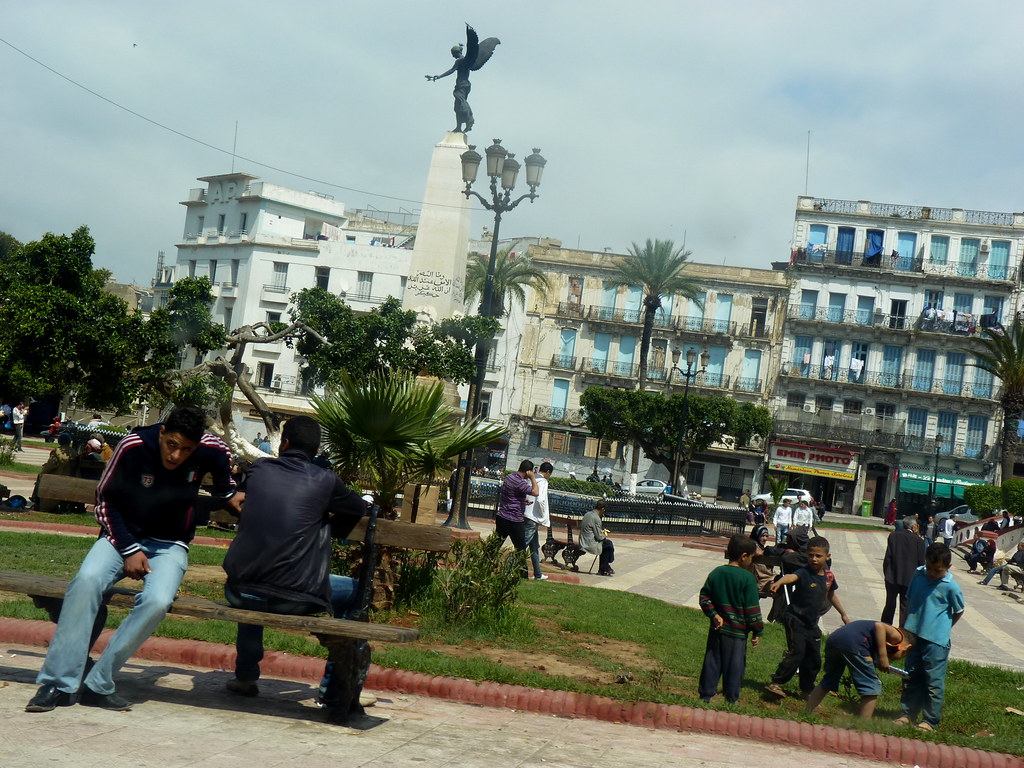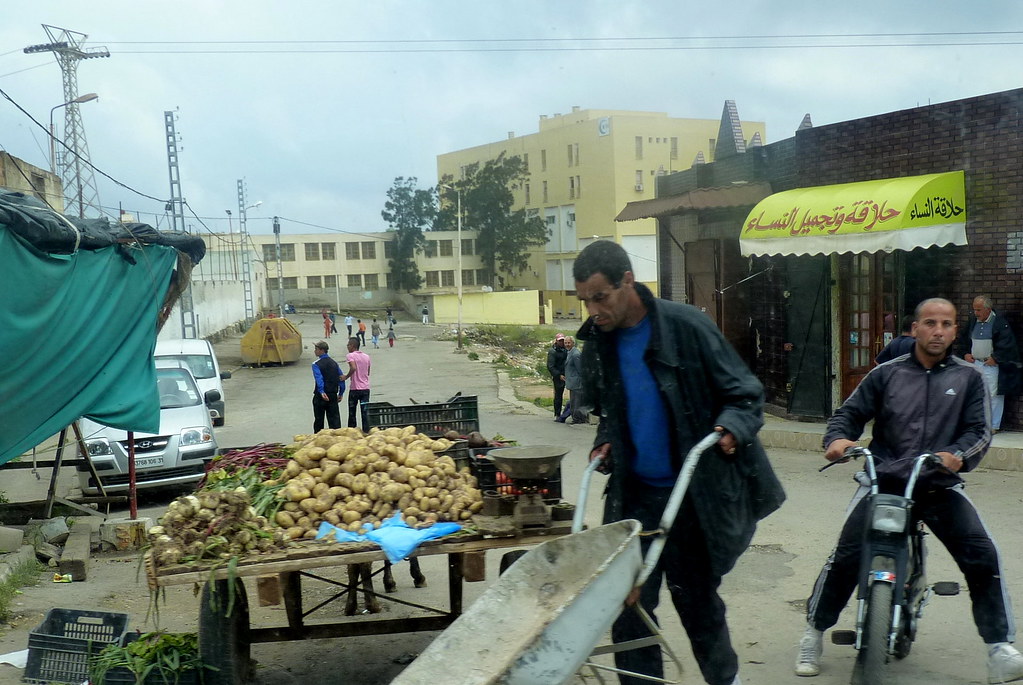ORAN — Carpets cover the ground, and large golden curtains divide the room in two to allow for a secluded space for sleeping. A small plastic swing for the children stands next to a small kitchen table. All to forget that we are in a garage.
But it has started to get cold here as winter arrives in this northern Algerian port city. John*, sitting in a chair, promises to find a solution before the temperature starts to drop further. He also urges the visitors not to talk too loudly. Only wooden blinds separate the room from the street.
In "Coca," a poor neighborhood on the outskirts of Oran, it is best to stay unnoticed — especially if you are black and undocumented. John, 30, arrived from Liberia in 2010, and lives with his wife, Gloria, and their children, four and two years old. Between 2008 and 2010, John had made five attempts to cross to Algeria, but was turned back at the border each time.
Now, the family rents the freezing garage for 15,000 dinars (130 euros) per month. "We do some illegal jobs, but we don't have papers, so we're not allowed to rent housing," says John.
What bothers the couple the most is that the kids do not go to school. In the modified garage, the restless kids run around, then turn to scribbling in their notebooks. "You can spend 20 years here, and be at the same place where you started, as if you had just arrived," he sighs.
Algeria has for some time been associated with harragas, the young Algerians illegally leaving by boat in attempts to reach Europe. But even if the phenomenon has not disappeared, it has decreased. The peace that followed the decade of civil war in the 1990s has contributed to an increase in French visas granted legally, as well as improved governmental control.
Instead, the country has increasingly been seen as a gateway for sub-Saharan migration toward Europe. Algerian authorities estimate that 20,000 illegal immigrants, and a total of 100,000 sub-Saharan nationals, are currently living in the country.
Along the road to exile
On their way to reach Europe, people from Cameroon, Nigeria, Mali and Ivory Coast often end up in Algeria. They stay there for a few months, or several years, in order to save enough money to continue their journey. Sometimes they give up, discouraged by difficulties. In Oran, there are about 4,000 of them, as the city has a reputation as being more open than the rest of the country. The city is also situated on the way to Maghnia, a city that borders Morocco. From there, they can try to reach European soil either by crossing the barrier of the Spanish enclaves of Ceuta and Melilla, or by taking the perilous sea route.

In Oran — Photo: Maya-Anaïs Yataghène
Irene left Douala, Cameroon, six years ago, selling off all her belongings to pay for the journey. She hoped her master's degree in Law would help her find a job in Europe. The journey took her to Nigeria, and then Niger — to the southern cities of Maradi and Zinder — before reaching Agadez, the gateway to the Sahara desert.
"That is where it all happens," she says. "When you arrive at the station, where there are tons of people, they ask you right away where you want to go."
After a week of waiting, she embarked on a truck towards Arlit, a mining town in northern Niger. Short of money, she sold her cell phone and suitcase for about 60 euros. The rest of the journey was made by car to Tamanrasset in southern Algeria. "They leave you several kilometers off in the wilderness, and you walk the last part, with the city lights as your guide," Irene says.
Irene stayed there for ten days until a Nigerian — involved in trafficking of illegal immigrants — offered her to work in Algiers for one of his brothers who needed a French speaker. "When I arrived, I realized that I had stumbled into some kind of marriage arrangement. I gave in," she says. "When you are a woman in an unknown world, your only chance is to get married and be with a man who takes care of you." Irene eventually left Algiers and moved to Oran, where she currently helps arriving immigrants.
Leila Beratto, an RFI French radio correspondent in Algeria who has long been investigating the subject, said the presence of migrants is nothing new, but changed with the influx of Nigerians in 2014, which led to more and more scenes of black Africans begging in the center of major cities. It did not go unnoticed in a traditionally closed country, and the reactions from the authorities came quickly. A repatriation agreement was signed by the Nigerian Government, and raids were conducted in Algiers and Oran.
"Today, the conflict in Mali has led to other implications than deportation," says Beratto. "If you are arrested for illegal immigration, you risk two months in prison. It's difficult to give exact figures, but the number of immigrants is increasing. The average period of time immigrants stay in Algeria is growing; today, it's about three years."
In addition to its proximity to Europe, Algeria has become, since 2011, an attractive destination. The fear of violence in Libya, the deteriorating economic situation in Tunisia, alongside the war in Mali have all contributed to an increased stream of immigrants. Algeria, with vast profits through its gas industry over the past 15 years, is also one of the richest countries in the region. With subsidies for energy and certain types of food, you can live there without spending too much.

Street scene in Oran — Photo: Maya-Anaïs Yataghène
In the district of Ain Beida, in the outskirts of Oran, Joseph, a quick-witted Cameroonian, says he has been here since 2009, working on construction sites. "It's true that in Morocco, there are many aid associations," he said. "But here, life is cheaper," Still, Joseph says he has not abandoned his plans to reach Europe.
Vulnerable populations
Like everyone, he knows that under Algerian law residence permits do not exist, which means that there are individuals without any rights. In early October, Algerian newspapers reported on Mary, a 33-year old migrant, who was gang raped in Oran, but found it difficult to seek treatment or file a complaint.
More generally, once in Algeria, migrants encounter a society not accustomed to ethnic diversity, and where racism is widespread. They often face the double disadvantage of being black and Christian in a Muslim country. Their goal is therefore to stay hidden from view, as much as possible, with most immigrants living in the outskirts of the city.
Still, some progress has been made since the arrival of NGOs who have worked to protect the rights of immigrants. Recently, the Ministry of Education promised that all children would have access to school, though activists say there is an urgent need for a new law on asylum.
Cynthia, a 20-year-old Cameroonian, was first sent to Lebanon to work for the state (for 230 euros per month) before landing in Algeria where she was abused and held prisoner. It took several months for her nightmare to end, thanks to an Algerian neighbor who called the police. Now she wants to go back to Cameroon, adding in a bitter voice: "I will return home empty-handed."
Irene, meanwhile, holds on to her dreams of going to Europe, and then to Canada "I still think of it," she says, "But I do not want to go by sea." She knows some have managed to cross — one of her relatives lives in Italy today — but others have died along the way. Without proper working papers, or the possibility of employment, a happy future in Algeria does not look like an option either.
*Names have been changed.





